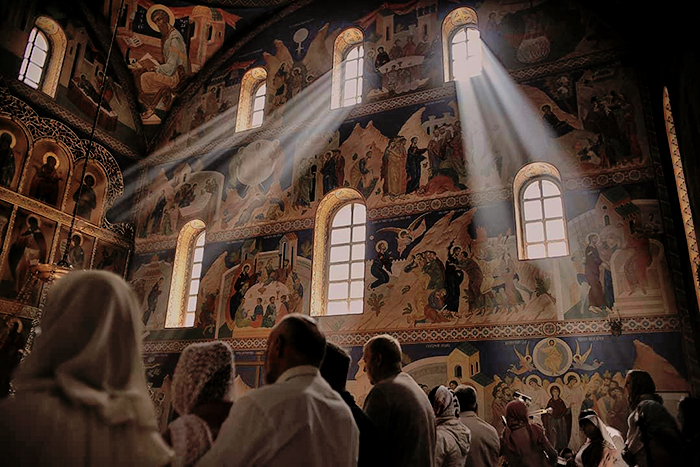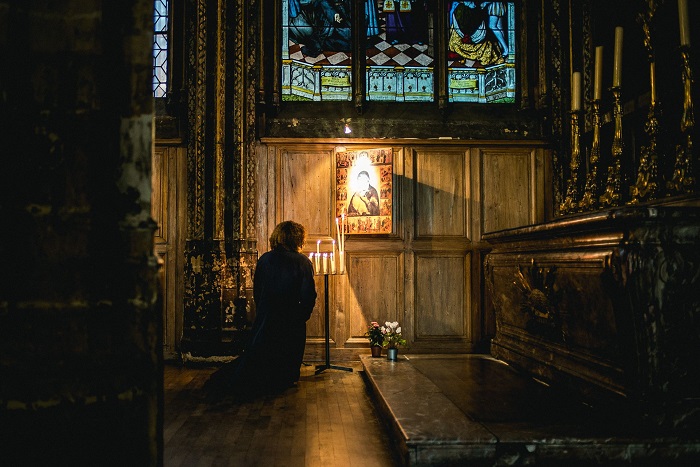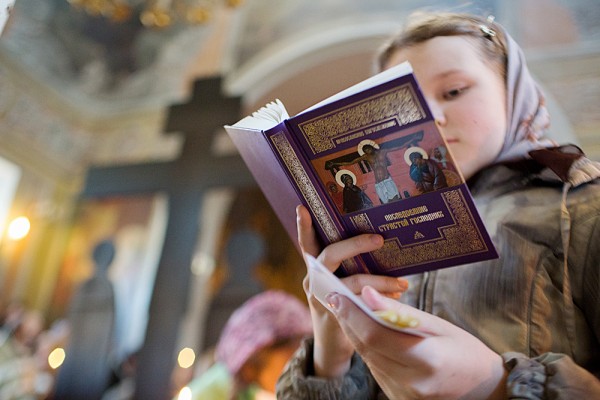
Mark 11:11-23
Ephesians 2:19-3:7
The day after His solemn entry into Jerusalem, the Lord went into the Temple and began to cast out them that sold and bought in the temple, and overthrew the tables of the moneychangers, and the seats of them that sold doves; And would not suffer that any man should carry any vessel through the temple. And he taught, saying unto them, Is it not written, My house shall be called of all nations the house of prayer? but ye have made it a den of thieves. Watching this, the Apostle John the Theologian remembered the words of the Prophet David, The zeal of thine house hath eaten me up (John 2:17). The Lord had seen plenty of sin, but it was only disrespect for the holiness of the Temple that made Him so indignant.
What is a temple, after all? During the consecration of the Jerusalem Temple, King Solomon prayed, But will God indeed dwell on the earth? behold, the heaven and heaven of heavens cannot contain thee; how much less this house that I have builded? Yet have thou respect unto the prayer of thy servant, and to his supplication, O LORD my God, to hearken unto the cry and to the prayer, which thy servant prayeth before thee to day: That thine eyes may be open toward this house night and day, even toward the place of which thou hast said, My name shall be there: that thou mayest hearken unto the prayer which thy servant shall make toward this place. And hearken thou to the supplication of thy servant, and of thy people Israel, when they shall pray toward this place: and hear thou in heaven thy dwelling place: and when thou hearest, forgive. (1 Kings 8:27-30).
A temple is necessary because the immaterial human soul is locked in the limited space of a body. That is why it is necessary not only to make your soul soar up to God but also to come together with your fellow believers to a special place devoted to prayer. There was only one such place in the Old Testament, so as not to spur the temptation to invent many gods to correspond to the number of temples. However, when the Lord Himself came to the earth, He said, [T]he hour cometh, when ye shall neither in this mountain, nor yet at Jerusalem, worship the Father, but in spirit and in truth: for the Father seeketh such to worship him (John 4:21-23).
The New Testament books often describe a new, spiritual temple that Christians must build in spirit and truth, built upon the foundation of the apostles and prophets, Jesus Christ himself being the chief corner stone, fitly framed together to grow unto an holy temple in the Lord. But in order to construct this dwelling of God, the disciples of Christ from the very beginning had to get together somewhere, which they did (Acts 2:42). While the Jerusalem Temple existed, they daily with one accord continued there (Acts 2:46), and they did the emblematic Christian “breaking of bread” by themselves “from house to house”. With the destruction of the Temple, they moved their meetings to private houses. When the persecution was over, they began to build their own temples. These buildings were filled with Christian symbols from inside and outside, and were decorated with images reminding about sacred figures and sacred events.
Nevertheless, churches were getting richer and richer, whereas the Christian spirit of the people who gathered in them was becoming scarce. It became normal to be called a Christian in the Christianized empire, but not everyone truly believed in God. Therefore, the Lord made sure that the spirit that had become depleted in Christians would be preserved in their houses of worship. A church becomes a powerful support to those who come there not consciously enough; it provides a sense of God’s presence without words, like the created world preaches its Creator without words. This spirit can be felt even in desecrated, half-ruined churches. Many architects and restorers who worked to rebuild those ruins gradually themselves became the rocks in the spiritual edifice of the Church of Christ.
Therefore, a church may be the last hope for a certain person’s conversion. Just as the Lord purged the Old Testament Temple, so He also purges our temples. When the Lord really does it, it looks like this: a godly minister comes to a temple where there is lawlessness. He does his job properly and endures humiliation with patience. When evil seems especially invincible, suddenly the lawless ones vanish one by one. It turns out according to the words of the Psalmist, I have seen the wicked in great power, and spreading himself like a green bay tree. Yet he passed away, and, lo, he was not: yea, I sought him, but he could not be found. Mark the perfect man, and behold the upright: for the end of that man is peace (Psalm 37:35-37). The Lord’s scourge will surely come as soon as the Lord’s patience is finally exhausted, and as soon as there is no one to fill the deserted house of prayer.
Translated by The Catalogue of Good Deeds
Source: https://azbyka.ru/otechnik/Vyacheslav_Reznikov/propovedi-na-kazhdyj-den/24_2



